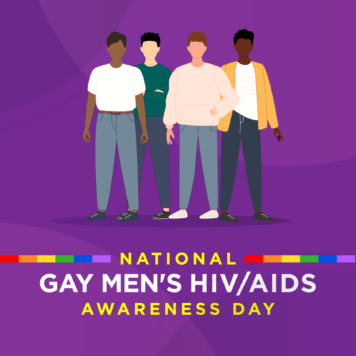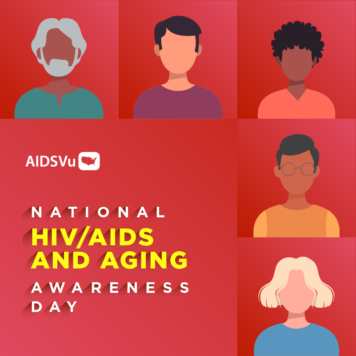Amy Baugher, MPH, is an epidemiologist for the Division of HIV/AIDS Prevention (DHAP) in the National Center for HIV/AIDS, Viral Hepatitis, STD, and TB Prevention (NCHHSTP) at the Centers for Disease Control and Prevention (CDC).
Q: You have worked across various roles in public health in the South, with a focus on HIV and populations who are disproportionately impacted by HIV, such as Gay and Bisexual Men and people who inject drugs. How did you get involved in this work? How did you become interested in HIV criminalization?
I had always been interested in sexual health, LGBTQ+ social justice issues, and social and political factors that influence people’s health and behavior. After college, I volunteered at an HIV/STI education hotline. While volunteering there, I saw how much stigma and misinformation there still was around HIV and how this was a barrier to people getting tested. Since then, stigma and discrimination have been my primary focus of study around HIV.
When I was in graduate school at Emory University Rollins School of Public Health, I worked at the Programs, Research, Innovation in Sexual Minority Health (PRISM) team on two studies that focused on the disparities between Black and White Gay, Bisexual, and other men who have sex with men (collectively referred to as MSM) in Atlanta. My master’s thesis focused on religious attitudes and stigma associated with homosexuality. I first joined DHAP as an ORISE (Oak Ridge Institute for Science and Education) fellow and later a full-time employee working on the Medical Monitoring Project, a nationally representative surveillance system for people with HIV. In 2019, I joined the team that leads National HIV Behavioral Surveillance in DHAP, which focuses on populations at increased risk for HIV.
I believe the political, economic, and social conditions in which we live– the social determinants of health – often have a more profound influence on our health than personal choices. After years of researching stigma, it has become clear to me that stigma operates as a multi-level threat for people with HIV: individual feelings of shame, interpersonal fears of disclosure and rejection, organizational discrimination against people with HIV, and discriminatory policies that legitimize stigma.
A few years ago, when I presented a poster on geographic differences in HIV stigma at a conference, an attendee asked me if the geographic differences in fear of disclosing one’s HIV status were affected by laws that criminalized HIV. This question inspired me to take a deep dive into researching the literature on these laws. Despite a scientific consensus that these laws are not effective at curbing HIV transmission, many remain in place.
Q: Sex workers, Black men, and other vulnerable populations represent most of the arrests and convictions from HIV criminalization laws. Your article “Black men who have sex with men living in states with HIV Criminalization Laws Report High Stigma,” published in AIDS, found that HIV criminalization laws were related to higher stigma, but only for Black Gay and Bisexual Men. How do racial disparities exacerbate the stigma perpetuated by HIV laws among Black Gay and Bisexual Men, compared to their White counterparts? What kind of effects does stigma have on health outcomes?
Many researchers who study HIV-related stigma have found evidence that HIV criminalization laws can legitimize stigmatizing attitudes towards people with HIV. Stigmatizing attitudes about groups that are marginalized — such as sex workers, Gay/Bisexual Men, transgender persons, and persons who inject drugs — intersects with HIV stigma. This can result in groups being blamed for HIV. These intersecting stigmas may have influenced the development and implementation of HIV criminalization laws, which were written before the science of HIV transmission was well-known.
Intersectional stigma occurs when people experience discrimination based on multiple, overlapping identities (e.g., race, gender, sexuality, HIV status). For example, Black Gay Men experience unique social and economic disadvantages that White Gay Men and Black heterosexual men do not experience. Since the beginning of the epidemic, Black Gay Men and Black cisgender and transgender women have been disproportionately affected by HIV, and this continues today. Concurrently, the United States is facing crises of racism, mass incarceration, and police brutality towards Black people. Studies1,2,3 have shown that HIV criminalization laws are unequally leveraged against Black persons with HIV.
Our analysis provides evidence that the stigma towards HIV is intertwined with stigmatizing attitudes towards Gay/Bisexual Men. Gay and Bisexual Men who lived in states with HIV criminalization laws were more likely to perceive their community as intolerant towards Gay/Bisexual Men.
In both our analysis and previous literature, studies find that HIV criminalization laws do not lead to fewer new HIV diagnoses or personal risk choices. These findings make sense because many people are likely not aware of their own state or local HIV laws. However, these laws reflect stigmatizing community attitudes towards HIV and health outcomes.
Stigma and discrimination can exacerbate racial/ethnic disparities in HIV outcomes. Given that Black Gay and Bisexual Men can experience multiple forms of intersecting stigmas related to racism, homophobia, and anti-HIV attitudes, there needs to be more cultural competency and anti-discrimination training for health care and service providers at clinics. This type of training can foster an environment where Black Gay and Bisexual Men feel comfortable attending the clinic to get testing and treatment, openly discuss behaviors, and receive equal care. One bad experience at a clinic can shape a person’s attitude about going to clinics for years to come.
Stigma can interfere with necessary HIV prevention and treatment efforts. In other studies4,5, people have reported feeling afraid to be seen getting an HIV test or taking pre-exposure prophylaxis (PrEP). Other studies have found that people with HIV experience discrimination in healthcare settings, which they usually attribute to stigma towards their HIV status, and also report finding it difficult to disclose their HIV status to other people.
Q: In your study, you conducted interviews with Black and White Gay and Bisexual Men about how they believe their community would perceive and interact with people with HIV (PWH). Can you expand on your findings?
In our analysis, Black Gay and Bisexual Men reported higher community HIV stigma overall than White Gay and Bisexual Men. Even among Black Gay and Bisexual Men, we found that those living in states with HIV criminalization laws reported higher stigma than their counterparts in states without these laws, controlling for possible confounders. Namely, they felt like their community would discriminate against persons with HIV, and their community would believe that people with HIV “got what they deserved.” On the other hand, White Gay and Bisexual Men reported few differences in stigma based on regardless of whether they lived in a state with HIV laws.
We also found that Black Gay and Bisexual Men were more likely than White Gay and Bisexual Men to say their community does not tolerate Gay/Bisexual Men. Historically, HIV stigma has been interconnected with prejudice against Gay/Bisexual Men. These interconnected stigmas appear to be stronger against Black Gay and Bisexual Men’s communities than White Gay and Bisexual Men’s communities. In our models comparing Black Gay and Bisexual Men in states with HIV criminalization laws vs. without HIV criminalization laws, we controlled for intolerance towards Gay/Bisexual Men, and we still found differences in stigma.
Although our survey doesn’t measure exactly why Black and White Gay and Bisexual Men reported such differences, we can look to previous literature for contextual factors. Black Gay and Bisexual Men experience dual marginalization from both racism and homophobia. Families, religious organizations, workplaces, and other social organizations that do not support homosexuality can lead to internalized homophobia, not revealing sexual orientation, and fear of being perceived as having HIV. Living in a community with a high prevalence of homophobic attitudes can make LGBTQ+ people feel isolated and like they can’t be their whole selves. Stigma drives behaviors underground and sets up barriers to openly discussing safety or HIV.
Other factors like historical medical mistreatment of Black people, lack of social support, religious attitudes towards HIV and homosexuality, and internalized homophobia were unmeasured, but are possible contributors to the differences in HIV stigma between Black and White Gay and Bisexual Men.
Q: Your research focused on the association between HIV laws and stigma in 23 U.S. cities. Can you explain how you picked these cities and the regional differences in HIV laws, stigma, and racial disparities across the various places?
The National HIV Behavioral Surveillance (NHBS) selected the 23 U.S. cities with high HIV burden based on HIV prevalence. These 23 cities represented approximately 59% of all persons diagnosed with HIV infection in urban areas with a population of at least 500,000 at year-end 2016. Although NHBS is not nationally representative of all Gay and Bisexual Men, we collected data from a large, diverse sample of Gay and Bisexual Men in the U.S. recruited using rigorous venue-based sampling methods and weighted data to account for methodological design biases. However, findings are not generalizable to all Gay and Bisexual Men (such as individuals living in rural areas or who do not attend gay-majority venues).
Nevertheless, in this analysis, we cover a wide range of states regarding HIV criminalization law status. In our sample, 16 project areas were in states with HIV criminalization laws; 7 project areas were in states without HIV criminalization laws.
Many southern states have punitive HIV criminalization laws, as well as disproportionately high rates of HIV and racial/ethnic disparities between Black and White Gay and Bisexual Men in HIV diagnoses, access to HIV care, and PrEP access and use. The additional stigma of HIV criminalization laws may further exacerbate these gaps and contribute to ongoing HIV infections in the South. Stigma can interfere with effective HIV prevention efforts, such as HIV testing and PrEP. We need to address stigma if we are to end the HIV epidemic in the U.S.
Q: The paper calls for modernizing HIV-related laws to “delegitimize stigma and promote focusing on effective HIV prevention strategies.” What message do you have for researchers, advocates, and other stakeholders in the HIV space on the importance of HIV decriminalization?
The main message is that these punitive laws are not an effective, evidence-based method to curb diseases. We have multiple effective public health strategies for preventing and treating HIV, but stigma interferes at every level, from the individual level to the policy level. Many HIV criminalization laws are not rooted in transmission science: for example, they do not account for whether a person with HIV has an undetectable viral load and is therefore, unable to transmit HIV to a sexual partner. Some of these state laws even criminalize spitting, which is not how HIV is transmitted.
Given that the laws have not been shown to prevent HIV but do legitimize stigma and propagate false narratives about people with HIV, states may consider modernizing or repealing these laws as several states have already done. As the CDC recently noted in The Lancet HIV, “It is time to align with science and consider reforming, rescinding, and revising the application of these laws for the sake of people with HIV and for the public’s health.”
Citations
1Harsono D, Galletly CL, O’Keefe E, Lazzarini Z. Criminalization of HIV exposure: A review of empirical studies in the United States. AIDS Behav 2017; 21(1):27-50.
2Cann D, Harrison SE, Qiao S. Historical and current trends in HIV criminalization in South Carolina: Implications for the southern HIV epidemic. AIDS Behav 2019; 23(Suppl 3):233-241.
3Hasenbush A, Miyashita, A., Wilson, B. HIV criminalization in California. Last Accessed: March 24, 2021. https://williamsinstitute.law.ucla.edu/wp-content/uploads/HIVCriminalization-CA-Dec-2015.pdf.




